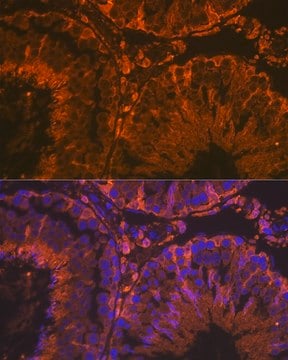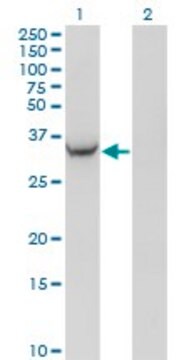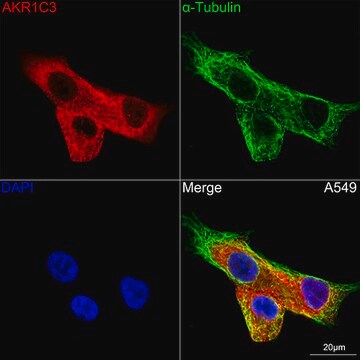A6229
Anti-AKR1C3 antibody, Mouse monoclonal
clone NP6.G6.A6, purified from hybridoma cell culture
Synonyma:
Anti-DD-3, Anti-DD3, Anti-HA1753
About This Item
Doporučené produkty
biological source
mouse
Quality Level
conjugate
unconjugated
antibody form
purified immunoglobulin
antibody product type
primary antibodies
clone
NP6.G6.A6, monoclonal
form
buffered aqueous solution
mol wt
antigen ~38 kDa
species reactivity
human
packaging
antibody small pack of 25 μL
technique(s)
immunohistochemistry: suitable
indirect ELISA: suitable
microarray: suitable
western blot: 0.25-0.5 μg/mL using cytosolic fraction extract of A549 human lung carcinoma cell
isotype
IgG1
UniProt accession no.
shipped in
dry ice
storage temp.
−20°C
target post-translational modification
unmodified
Gene Information
human ... AKR1C3(8644)
General description
Immunogen
Application
- western blotting
- immunohistochemistry
- enzyme linked immunoassay (ELISA).
Immunohistochemistry (1 paper)
Biochem/physiol Actions
Target description
Physical form
Disclaimer
Ještě jste nenalezli správný produkt?
Vyzkoušejte náš produkt Nástroj pro výběr produktů.
Storage Class
12 - Non Combustible Liquids
wgk_germany
WGK 2
flash_point_f
Not applicable
flash_point_c
Not applicable
ppe
Eyeshields, Gloves, multi-purpose combination respirator cartridge (US)
Osvědčení o analýze (COA)
Vyhledejte osvědčení Osvědčení o analýze (COA) zadáním čísla šarže/dávky těchto produktů. Čísla šarže a dávky lze nalézt na štítku produktu za slovy „Lot“ nebo „Batch“.
Již tento produkt vlastníte?
Dokumenty související s produkty, které jste v minulosti zakoupili, byly za účelem usnadnění shromážděny ve vaší Knihovně dokumentů.
Náš tým vědeckých pracovníků má zkušenosti ve všech oblastech výzkumu, včetně přírodních věd, materiálových věd, chemické syntézy, chromatografie, analytiky a mnoha dalších..
Obraťte se na technický servis.







